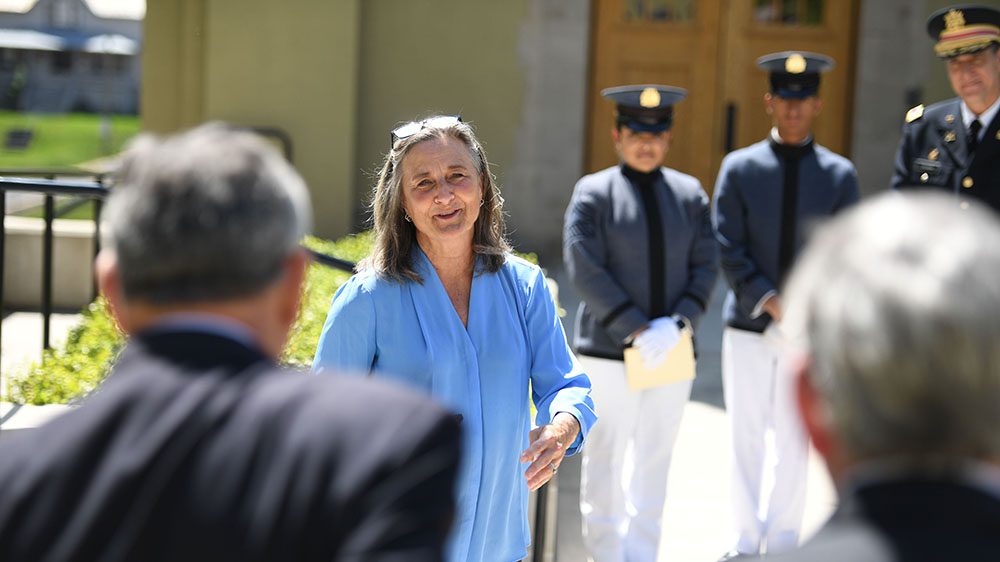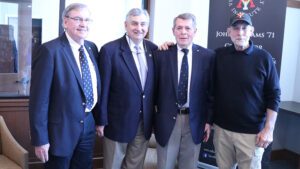John Adams ’71 Remembered at Memorial Service

Paige Blanchat, a cousin of Gail Adams, speaks at the memorial service for Gail and John Adams ’71 April 22 in Memorial Garden.—VMI Photo by Kelly Nye.

Paige Blanchat, a cousin of Gail Adams, speaks at the memorial service for Gail and John Adams ’71 April 22 in Memorial Garden.—VMI Photo by Kelly Nye.
On Friday, April 22, alumni from the Class of 1971, history department faculty, and other members of the VMI community gathered in Memorial Garden for a service honoring the life and legacy of the late John A. Adams ’71 and his wife, Gail. Following the service, which included the sprinkling of both Adams’ and Gail’s ashes, attendees were invited to a reception so they could tour the newly expanded John A. Adams ’71 Center for Military History and Strategic Analysis, which opened this semester following the completion of renovations to Scott Shipp Hall.
Adams, a corporate economist who died in July 2018, established the center that bears his name in 2002 to further the study of Cold War history at VMI. Although not a professionally trained historian, Adams was a passionate student of that subject and a noted author. He was a graduate of Johns Hopkins University, having spent one year at VMI.
The memorial service, led by Lt. Col. John Casper ’04, associate chaplain, featured remarks from those who knew Adams well.
“John was bigger than life,” said Paige Blanchat, cousin of Gail Adams, before she and her cousin Scott Crowgey, Gail’s brother, sprinkled the couple’s ashes. “He was big in stature. He had giant hands. He had a big voice. He had big opinions. He thought big.” She described a man who was opinionated but kind and loyal to his many friends and willing to help those in need.

Representing the Class of 1971 at the dedication of the John A. Adams ’71 Center for Military History and Strategic Analysis are (from left) Jim Gearhart ’71, Warren “Buddy” Bryan ’71, Jim Kelly ’71, and John Metzger ’71.—Photo by Mary Price, VMI Alumni Agencies.
Col. Bradley Coleman ’95, Ph.D., professor of history and the Adams Center’s longtime director, remembered Adams as “deeply generous and deeply committed to the work and the mission of this institution.”
Representing the Class of 1971 were Warren J. “Buddy” Bryan ’71, Jim Gearhart ’71, John Metzger ’71, and Jim Kelly ’71, class agent. In his remarks, Bryan stressed the bonds among the class, expressed by Williams Shakespeare in his play “Henry V”: “We few, we happy few, we band of brothers.” That spirit of unity pervaded the class and still does, Bryan noted.
“We stayed in formation,” said Bryan. “We carried our rifles, and we carried the rifles of those who were starting to lag, and if necessary, we even carried them as well. That’s one of the lessons John took when he left here after his rat year. He had one year here of his 70, and they had a profound impact on him: Honor, perseverance, brotherhood.”
In speaking to visitors during the reception, Coleman emphasized what having a dedicated, 3,600-square-foot space for the center means for cadets, as before the recent renovation of Scott Shipp Hall, the Adams Center was housed in Coleman’s very small office, with books stacked precariously high.
“It’s a meeting space, a platform for collaboration between a lot of cadets and faculty in a way that we can do interdisciplinary work and promote collaboration and cooperation between and among departments,” said Coleman. “So, it is a way for us to raise the profile, the prestige of the center, and the visibility of the center among our stakeholders here on [post].”
With cadet assistants such as Jocelyn Artman ’22 on board, the Adams Center now stays open until 11 p.m. each night so cadets can access its deep archive of Cold War literature and other resources.
A history major who plans to attend law school down the road, Artman enjoys working with younger cadets who are new to the demands of college-level research.
“It’s been a really good experience being able to be in a physical space that is brought to us by John Adams himself,” she commented. “I’ve had cadets come to me and look for research, not knowing where they’re going with it. It’s been pretty meaningful to be able to work in a space that is dedicated to that.”
Col. Houston Johnson V, Ph.D., head of the history department, also sees the benefits of the Adams Center expansion. “The history department is extremely gratified to see John Adams’ vision become a physical reality in the form of the new Adams Center space,” Johnson commented. “While Colonel Brad Coleman has been ably deploying programming for the past decade, the new space will enable the department and the center to offer faculty, staff, and cadets expanded opportunities in the form of a dedicated reading room, ready access to a valuable library, and space in which to conduct programming.”
More opportunities for cadets will also be possible thanks to the expanded space.
“The new space also offers leadership opportunities for cadets in the form of center-funded internships,” said Johnson. “The ongoing relevance of Cold War History—particularly in light of the Russian invasion of Ukraine—only further emphasizes the value of the center’s focus on military history and strategic analysis.”

The development writer plays a key role in producing advancement communications. This role imagines, creates, and produces a variety of written communication to inspire donors to make gifts benefiting VMI. Utilizing journalistic features and storytelling, the development writer will produce content for areas such as Annual Giving, stewardship, and gift planning.